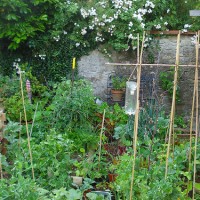Like us plants can do with companionship. Companion planting is about planting certain plants together that will help to reduce pests, shield from the sun or wind, or just plain help the growing conditions to the benefit all the plants together in a particular area.

Generally you like to keep certain plants out of the shade because they do best in full sunlight. However, some plants are “shade plants.” If you don’t have a tree or other suitable place to put a shade plant, no problem. All you have to do is plant taller flowers around the shade plant to keep it out of the sun for most of the day.
For example, certain species of geraniums, poppies, irises, lilies, Jacob’s Ladder and periwinkle flowers do well in heavily shaded areas. There are also plenty of plants and flowers that thrive in partially shaded areas, such as primrose, foxglove, and the daylily, just to name three.
Another form of “nurse cropping” is to plant flowers, herbs and vegetables near each other that are thought to help the growth of their companion plant. Indeed, many gardeners have known that some plants just do well together, even though they didn’t know why. Some researchers are just now starting to uncover the scientific reasons.
For example, some plants (like marigolds) expel chemicals that repel insects, while other plants (like legumes) seem to help create more favorable growing conditions.
Here then are a few examples of plants that do well together:
Beans do well alongside cucumbers, strawberries, corn and celery.
Corn does well next to cucumber, peas, pumpkin and squash.
Carrots do well next to rosemary, sage, onion, lettuce and tomatoes.
Lettuce does well next to cucumbers, carrots, strawberries and radish.
Spinach grows well alongside fava beans and strawberries.
As usual, it all comes down to careful research and planning. Above all, be sure to research the flowers, vegetables and herbs you’re interested in to find out types of plants you should avoid planting next to them. Then you can research to find out if there are any beneficial plants that would grow well in your garden.
